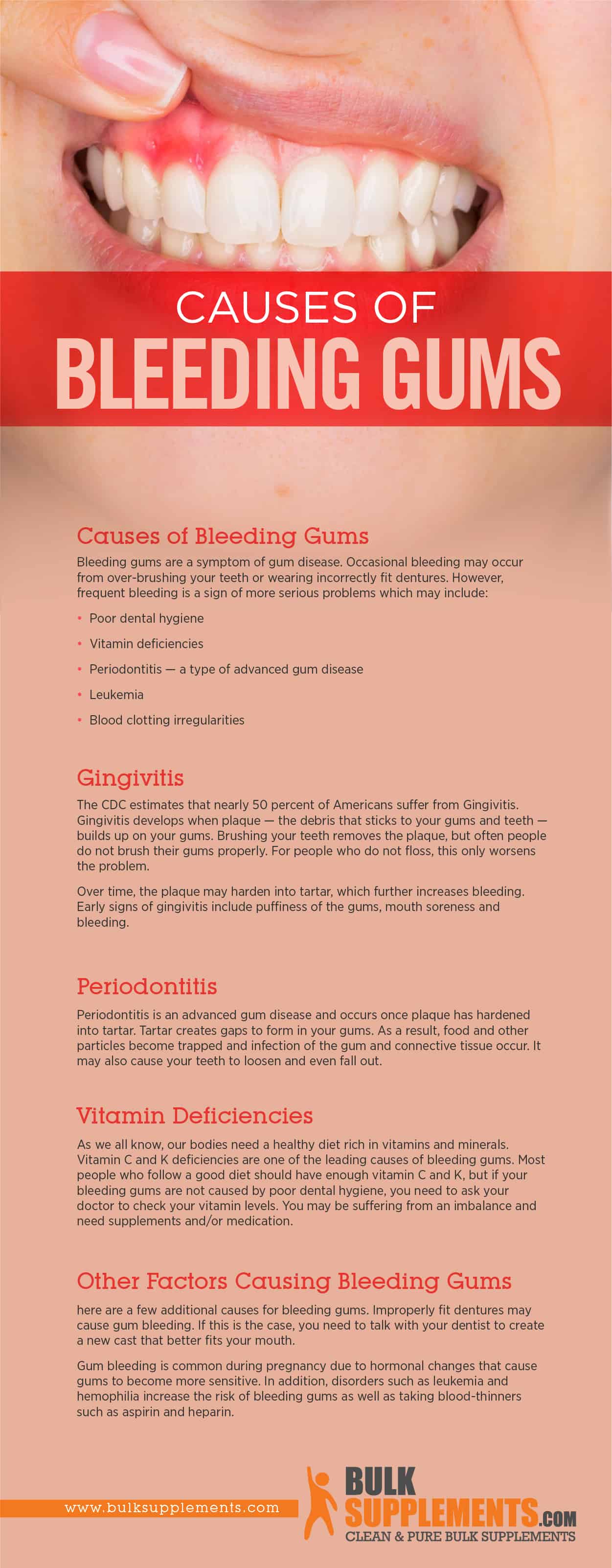Bleeding Gums: Characteristics, Causes & Treatment

Bleeding Gums
What are Bleeding Gums?
According to the American Academy of Periodontology (AAP), three out of every four Americans suffer from some form of gum disease. While most of these cases are mild, a large percentage of them are severe enough to create bleeding gums, among other symptoms. Worse yet, even with these painful symptoms, few people seek treatment for them.
So what causes bleeding gums? And how exactly can you treat them?
Depending on how advanced the condition, there are plenty of ways for you tohattreat yourself before heading to the dentist. Let’s start with the basics.
Causes of Bleeding Gums
Bleeding gums are a symptom of gum disease. Occasional bleeding may occur from over-brushing your teeth or wearing incorrectly fit dentures. However, frequent bleeding is a sign of more serious problems which may include:
- Poor dental hygiene
- Vitamin deficiencies
- Periodontitis — a type of advanced gum disease
- Leukemia
- Blood clotting irregularities
Bleeding Gums Caused by Dental Problems
Most often, bleeding gums are caused by dental problems often linked to poor dental hygiene. Depending on the severity of them, they may be treatable simply by increasing the amount of times per day you brush your teeth, floss and use an antiseptic mouthwash. The most common dental conditions that cause bleeding gums include:
Gingivitis
The CDC estimates that nearly 50 percent of Americans suffer from gingivitis. Gingivitis develops when plaque — the debris that sticks to your gums and teeth — builds up on your gums. Brushing your teeth removes the plaque, but often people do not brush their gums properly. For people who do not floss, this only worsens the problem.
Over time, the plaque may harden into tartar, which further increases bleeding. Early signs of gingivitis include puffiness of the gums, mouth soreness and bleeding.
Periodontitis
Periodontitis is an advanced gum disease and occurs once plaque has hardened into tartar. Tartar creates gaps that form in your gums. As a result, food and other particles become trapped and infection of the gum and connective tissue occur. It may also cause your teeth to loosen and even fall out.
Vitamin Deficiencies
As we all know, our bodies need a healthy diet rich in vitamins and minerals. Vitamin C and K deficiencies are one of the leading causes of bleeding gums. Most people who follow a good diet should have enough vitamin C and K, but if your bleeding gums are not caused by poor dental hygiene, you need to ask your doctor to check your vitamin levels. You may be suffering from an imbalance and need supplements and/or medication.
Other Factors Causing Bleeding Gums
There are a few additional causes for bleeding gums. Improperly fit dentures may cause gum bleeding. If this is the case, you need to talk with your dentist to create a new cast that better fits your mouth.
Gum bleeding is common during pregnancy due to hormonal changes that cause gums to become more sensitive. In addition, disorders such as leukemia and hemophilia increase the risk of bleeding gums as well as taking blood-thinners such as aspirin and heparin.

How to Treat Bleeding Gums
Preventing and managing bleeding gums begins with proper dental hygiene. Start with visiting your dentist twice each year for an examination and cleaning. Your dentist will inform you if you have gingivitis and teach you proper brushing techniques. Also, although you may be tempted, do not lie to your dentist about how often you floss!
Strong dental hygiene habits prevent plaque buildup and the onset of periodontal disease. Your doctor may also advise you to use an antiseptic mouthwash, which will reduce plaque-forming bacteria in your mouth.
People with sensitive or inflamed gums should rinse with warm salt water to reduce inflammation. You should also switch to a soft toothbrush as hard bristles irritate sensitive gums and cause bleeding.
Remember, brushing your teeth is not the same things as cleaning the floor. You do not need to scrub your hardest with strong bristles. This is doubly true for people with sensitive gums. You may also want to consider an electric toothbrush as these are typically designed to clean your gum line better than a standard toothbrush.
If your dental hygiene is not the cause of bleeding gums, then be sure to schedule an appointment with your doctor. You may need to do a physical examination and a blood test to determine the underlying cause of your bleeding. Medication and treatment will vary depending on the condition.
SEE ALSO

Sudden Cardiac Arrest: Causes, Symptoms & Treatment
Supplements and Dietary Improvements
Your diet also strongly influences your oral health. Be sure to avoid foods high in sugar that may cause cavities and gum disease. Likewise, smoking leads to dry mouth, which is another leading contributor to dental problems. It is essential to drink plenty of water per day and avoid excessive alcohol consumption.
As mentioned, vitamin deviancies are also a leading cause of bleeding gums. The following dietary supplements can help prevent the onset of symptoms and improve overall health:
Vitamin C
Vitamin C is a powerful antioxidant and anti-inflammatory essential for our health. Although we know it’s best as an immune system booster, it is also essential in maintaining the health of our teeth and gums by working together with other essential minerals like iron and healthy fats.
Ascorbyl Palmitate
Also known as vitamin C ester, ascorbyl palmitate is a great complement to a vitamin C supplement. Vitamin C is water-soluble whereas Ascorbyl Palmitate is fat-soluble. This means a difference in how your body processes it. In this form, more of the vitamin C is absorbed so you see more of its great benefits.
Vitamin K
Vitamin K deficiency is also a leading cause of bleeding gums. Fortunately, you can find it in abundance in a wide array of foods including kale, spinach, watercress, soybeans and olive oil. If you are taking any blood thinners, you definitely need a vitamin K supplement of 90-120 mg per day depending on your age and gender.
D-Ribose
Often referred to as ribose, your body uses this essential sugar for energy. It works with the mitochondria (power stations) in your cells and is an effective booster for your cardiovascular system and decreases pain levels. You can also use it as a healthy substitute for sugar. Doctors recommend a 5 mg (or ½ teaspoon) of D-ribose per day with meals. You mix it easily into any beverage.
The Bottom Line
Bleeding gums are extremely common. They often result from poor dental hygiene along with key vitamin deficiencies. With the right changes in dental habits, including a twice annual professional cleaning along with the help of these key supplements, you can prevent bleeding gums and promote not just healthy teeth and gums, but boost your overall health.



